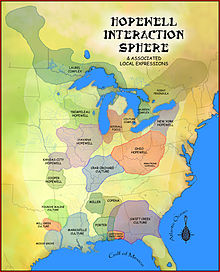
Back تقليد هوبويل Arabic Cultura Hopewell Catalan نەریتی ھۆپوێڵ CKB Hopewell-Kultur German Cultura Hopewell Spanish فرهنگ هوپول FA Hopewellin perinne Finnish Culture Hopewell French תרבות הופוול HE Cultura Hopewell Italian
 Hopewell Interaction Area and local expressions of the Hopewell tradition | |
| Geographical range | Midwestern United States |
|---|---|
| Period | Middle Woodland period |
| Dates | 100 BCE to 500 CE |
| Type site | Hopewell Mound Group |
| Major sites | Newark Earthworks |
| Preceded by | Adena culture |
| Followed by | Fort Ancient, Mississippian culture |
| Defined by | Warren K. Moorehead |
The Hopewell tradition, also called the Hopewell culture and Hopewellian exchange, describes a network of precontact Native American cultures that flourished in settlements along rivers in the northeastern and midwestern Eastern Woodlands from 100 BCE to 500 CE, in the Middle Woodland period. The Hopewell tradition was not a single culture or society but a widely dispersed set of populations connected by a common network of trade routes.[1]
At its greatest extent, the Hopewell exchange system ran from the northern shores of Lake Ontario south to the Crystal River Indian Mounds in modern-day Florida. Within this area, societies exchanged goods and ideas, with the highest amount of activity along waterways, which were the main transportation routes. Peoples within the Hopewell exchange system received materials from all over the territory of what now comprises the mainland United States. Most of the items traded were exotic materials; they were delivered to peoples living in the major trading and manufacturing areas. These people converted raw materials into products and exported them through local and regional exchange networks. Hopewell communities traded finished goods, such as steatite platform pipes, far and wide; they have been found among grave goods in many burials outside the Midwest.[2]
- ^ Douglas T. Price; Gary M. Feinman (2008). Images of the Past, 5th edition. New York: McGraw-Hill. pp. 274–277. ISBN 978-0-07-340520-9.
- ^ Fagan, Brian M. (2005). Ancient North America. Thames and Hudson, London.